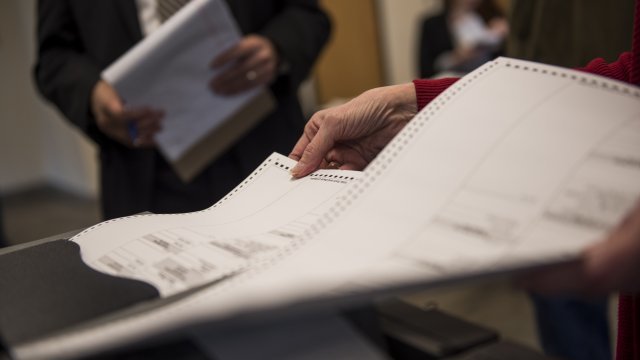In a time when our president's rhetoric is personal and Democrats are hitting back, the nation is paying attention and picking up on the division. A recent NBC News/ Wall Street Journal survey says eight of 10 people polled say they believe the country is "mainly" or "totally" divided. Americans agree on one thing: They don't agree on most topics. On the rest, we're really struggling to find common ground.
"There's been a lot of opinion we are heading into a situation where it's one side vs. another, and a lot of people are calling for civility, and I'm not really sure if we know what that is," said political scientist Terri Givens. She has been traveling to southern states to look at political divides. Givens says a lot of division is surrounding big issues like voting and immigration. But as a student of history, she remembers we have seen a lot worse.
"We tend to forget about a lot of the conflict that happened throughout our history around things like the suffrage, the vote for women, the civil rights movement, the anti-Vietnam War movement," Givens explained. "I think 1968 is a good time to look at because that was such a critical year in terms of civil rights, assassinations, and I don't think we're there yet."
But while that was arguably one of the most divisive times we've seen in our history, there is a glaring difference. She says presidents back then didn't get engage in the type of heated rhetoric we've seen from President Donald Trump.
"Presidents at the time were definitely taking more of a leadership position and trying to stay out of the conflict," she said. "The expectation for a president is that he's going to be a leader to take the high ground, and we don't have that."
And that division has been reflected in polling. The Pew Research Center says the divisions between Republicans and Democrats on fundamental political values like government, race, immigration and national security skyrocketed under Barack Obama. But those numbers were eclipsed in just the first year of Trump's presidency. Givens says the 24-hour news cycle, rhetoric from politicians and pundits, and constant focus on elections all play a role.
"It's a time when you're going to see people pushing the boundaries because we're in a very hyper-partisan election where so much is on the line," Givens said. "During the campaign between JFK and Nixon, when Nixon had to go to the hospital, Kennedy stopped campaigning. I don't see that happening in this day and age."
Living in this perpetual divide has really pushed people to run to their corners. Pew found "the share of Democrats who say they are mostly liberal has nearly doubled from just 30 percent in 1994 to 56 percent today." Republicans have also seen an increase, but definitely not as intensely.
Still, there is a glimmer of hope. While Republicans and Democrats have shown a dramatic increase in their distaste for each other's views in the last two decades, Pew found it has steadied out in recent years. But Givens says it's unlikely both sides will tamp down their attacks, and it's likely to get worse before we see any sort of coming together.


